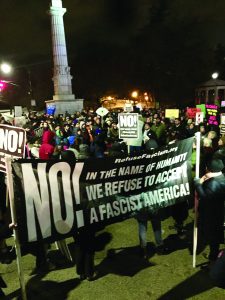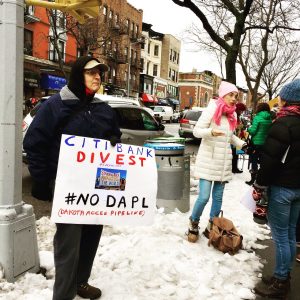On September 12, New York City’s incumbent Mayor, Bill de Blasio, sailed through the mayoral primary with 74.6% of the vote. The next day, Park Slope resident Libby Edois-Alb, one of the mayor’s longtime advisers and friend of the family, announced she was running a write-in campaign against him as the “true” progressive candidate. I sat down with her ahead of the November 7 general election to discuss what made her decide to run, whether the decision has created a rift between her and the mayor, and what she means when she says “true” progressive.
Roberto Paul: So you recently announced that you’re running for mayor on a “true” progressive platform. Can you tell us more about what you mean by this distinction?
Libby Edois-Alb: Sure. So many times we see candidates campaigning as progressives and then once they are elected they abandon nearly everything progressive they promised. My good friend Mayor de Blasio is a prime example of this. He campaigned on police reform, affordable housing, green energy, etc., and then once elected he started taking millions of dollars from real estate, doubled down on Broken Windows arrests targeting the very people he promised to defend on the campaign trail, softened his stance on police, and refused to address the cloud of smog hanging over the New York City metro region every day.
And why do you think he did this?
Well, I think once candidates get elected they realize that if they want to get re-elected there are powerful lobbies and interest groups with the money and political influence they need to raise money. They end up selling out their values in order to build a war chest big enough to scare off any potential challengers in the current money-takes-all system.
Those are strong words, and I know the mayor is a longtime friend of yours. Do you worry that by speaking so candidly you might jeopardize your relationship with him?
Honestly it’s too late for all that. Leading up to the 2013 campaign he spent hours upon hours consulting me. Night and day he labored over each and every point of his platform. I spent years helping him hone a progressive message that was moral, just, incorruptible, one that erred on the side of defending society’s vulnerable. All the ideals he personified during his first campaign, the real talk with police, spending a night in public housing, the tale of two cities – all of that came directly from his consultations with me, while he lay awake at night, tossing and turning in his bed, and then to seem him win, move into Gracie Mansion, and so abruptly abandon everything we planned hurt me very deeply.
So you would say that you were his conscience, his voice of reason, if you will?
Yes, definitely, his progressive mother protector alter ego.
And so now that you are running against him how will your campaign be different?
It’s quite simple, really. I’m going to run on the progressive platform that we perfected together over the years, the one he abandoned. I’m going to commit to raising no money, ever. Not from individuals, not from corporations, not from anyone.
Well, I mean the obvious rebuttal to that is that you won’t be competitive. Without money you won’t get on the ballot, qualify for televised debates, receive matching public funds, the list goes on and on. How will you get your message out to voters?
I think that the majority of the public is as fed up with money in politics as I am, and they will hopefully understand and appreciate why a candidate would commit to such a drastic course of action. We’ve got to start relying on voters, particularly those who claim they are part of the “resistance,” to go the extra mile and help us get our message out without money. I’d also like to take this opportunity to publicly challenge Bill to do the same, to commit to raising and spending no money, ever, but sadly I know that he won’t do it.
And what is the message you hope that voters will get out there for you, since you won’t be able to pay for any advertising or campaign materials on your own?
Because I accept no money, I’ll be able to spend all of my time working on my five-point platform for all New Yorkers, rather than scurrying from fundraiser to fundraiser like my opponent. One: No money, ever. That one’s simple. Two: Make New York a real sanctuary city. Three: Police reform. Four: Affordable housing. Five: Make NYC green.
Do you care to elaborate on these further?
Yes, of course. Point One I explained. Point Two: I will make New York a real sanctuary city. Federal agents were recently caught lurking around a Brooklyn courthouse, arresting people with no prior criminal records. On day one I am going to issue a blanket trespass warning to all ICE agents on city property. If you don’t have a warrant signed by a judge in your possession, you are trespassing. And if you don’t stay away from the city’s courthouses, schools, MTA stations, etc., the NYPD is going to escort you off the premises and arrest you if you fail to comply.
That sounds like a provocative, but relatively easy legal measure to implement. Why do you think the mayor hasn’t done this yet?
As I said, I think it’s about being progressive in name only. Of resisting with words, and symbolic gestures, rather than implementing real policies with legally enforceable teeth.
Okay, and the rest of your platform?
When Bill ran he talked constantly about police reform. Then he got elected and realized how powerful and politically connected the police unions were and backed off. On my first day as mayor, I plan to end Broken Windows policing and other low-level arrest dragnets and devote all of the police resources this frees up to solving hate crimes and infiltrating and arresting members of known white supremacist terrorist hate groups.
I also plan to appoint an independent panel of officers who objected to the illegal conduct of their superior officers during Stop and Frisk, like Edwin Raymond, Adhyl Polanco, and others like them, and I’m going to task them with conducting an exhaustive internal review of all NYPD (and NYC Corrections) personnel files. Any cases where probable cause exists that a crime was committed by a city employee will result in the filing of the appropriate criminal charges forthwith. Further, officer(s) with three or more misconduct judgments will be deemed unfit for service and terminated without pay, pension, or benefits. From the moment I’m elected and as long as I’m mayor, the taxpayers of New York will pay one misconduct judgment per officer. Accidents happen. For any and all subsequent judgments officers will be held personally liable. We’ll see how long police and COs continue to rack up civil rights judgments while paying them out of pocket;
Don’t you think that this will cause the police and corrections lobbies to turn their backs on you, and refuse to work, like they did to Mayor de Blasio?
No doubt, and the union bosses will crimson and spittle and call me a bunch of names, too, but this was why I spent years with Bill trying to steel his moral resolve. It’s why we discussed how this is in reality a pro-police stance (because by committing misconduct and getting away with it, the police have eroded the public trust that undergirds a working criminal justice apparatus). By holding them accountable, I’m restoring faith in them and the important work that they do. The police take an oath to uphold and defend the law. I am simply asking them to keep their word, and, if they can’t, to find a new line of work.
What will you do with the money the city saves on misconduct, and on benefits and pensions for terminated officers, which in recent years has risen into the hundreds of millions, and even billions?
Yes, exactly. Experts in corrections and public safety have known for 30 or 40 years how to effectively prevent recidivism and reduce crime. Yet despite a host of proven programs and rock-solid data showing us how to keep New York City safe without aggressive and alienating law enforcement tactics, we keep adding more officers, more money, and more military-grade war gear to an already bloated $4.8 billion police budget, while spending a paltry fraction of that amount on programs that the data shows are far more effective.
There has been a lot of talk during the campaign about affordable housing. You said you plan to address this issue as part of your platform. How?
Yes, I do, I plan to address it specifically as it relates to displacement by gentrification. During the primary people kept highlighting how Bill froze rent increases and created more affordable housing than any mayor in city history. This was a great sound bite, but quite literally everyone I know in New York saw their rent increase during the last four years. Very few could’ve passed the intensive credit check and salary vetting to qualify for one of the supposedly “affordable” housing lottery units even if they’d beaten the one in a million odds of getting selected to apply for one (though nobody I know did, you?).
These are obviously cosmetic gestures and woefully insufficient to meet the amount of need for affordable housing that exists throughout the five boroughs. Starting on day one, I plan to turn all parcels of city-owned land over to community-run public land trusts that will determine how to best convert the properties into affordable housing.
Any real estate developer that wants a permit for a private project will need to commit to hiring 75% of workers from the area surrounding the site. They’ll be required to deed 10% of new units to recently displaced residents of the area, and devote an additional 40% of units to affordable rental housing as measured by an amount equal to or lesser than the lowest median income of the proposed site’s zip code for a period covering 20 prior years, with first rental lottery preference given to residents with longest residence.
I also plan to give tax breaks and multiple operating incentives to businesses that hire and train young people previously involved in the criminal justice system, and specifically those that live in neighborhoods directly in the crosshairs of blistering gentrification. Gentrification lives in this gap, where incoming businesses refrain from hiring long-time residents, and especially those who have previously been involved in the criminal justice system – or if they do hire them, it’s for menial labor that doesn’t pay a living wage – and I will implement a schedule of incentives and penalties designed to close this gap ASAP.
Are there any other issues you plan to address?
Another issue that needs to be urgently addressed is traffic congestion and pollution around the city. I was in Sunset Park the other morning and the massive cloud of smog leering at the city was horrific. How this has not been addressed in any meaningful way by a progressive mayor with four years under his belt is preposterous. Accordingly, I plan to phase fossil-fuel powered vehicles out of New York City by the end of my first term.
Year one, if you drive a fossil-fuel powered vehicle during rush hour you’ll pay $10 on your way in and $10 on your way out. If you use a commute-sharing app, which allows commuters from nearby areas to find one another and carpool, the toll will be $7.00 per trip with two people checked in, $3.00 with three, and $0 with four. Year two the top charge for solo drivers will increase from $10 to $20, year three from $20 to $40, and so on. The charge for a four-person check-in will increase from $0 to $2, $2 to $4, etc.
Electric and solar-powered vehicles will pay no toll, and the city will create tax and parking incentives that will promote the increased purchase and use of environmentally friendly vehicles. I plan to introduce similar penalties for buildings and businesses, with similarly generous incentives for those that choose to go green. The substantial revenue generated by the penalties for delaying or refusing to go green will go towards revamping and improving the city’s crumbling and embarrassing public transportation infrastructure, which the governor and state officials have proven they cannot be trusted to manage.
The bottom line is that so-called progressives can no longer allow a brown cloud of exhaust to hang over the city every morning during rush hour while just about every car sitting in traffic is occupied by a single person – I mean literally nothing could be stupider for a city surrounded by water on all sides than to continue allowing this.
So, let’s do a quick recap: No money in politics; taxpayers no longer pay for repeat official misconduct; create enough affordable housing to meet need; reduce pollution; improve public transit infrastructure.
Yes, that’s right.
You know, if you threw in universal health care and a freeze on military spending, you might have a platform that could be used as a litmus test for all progressive candidates.
Yeah, maybe, like an ALEC for progressives, or something.
How about PALEC?
Haha, I like that.
Which leads me to ask: if New York is widely regarded as one of the most progressive cities in America, how is it that you find yourself in this position?
Which position? Waging a longshot write-in campaign a month before Election Day?
Precisely. In this day and age of supposed “resistance,” the positions you have outlined, or some modified iteration of them, should be automatic it seems, part of every platform. How isn’t there a single candidate in the mayoral race that already supports them?
It’s a good question. These are all pretty basic reforms that would most likely have been implemented a long time ago if money and powerful interests hadn’t commandeered our local, state, and federal election processes. But commandeer them they have, and they show no signs of returning them to us voluntarily. Which means we’ll have to hope and pray that Bill comes to his senses in his second term, realizes that his mother protector, his progressive conscience – that is, me – is not a real person, and that I can’t run for political office. We’ll have to hope he remembers where he left me four years ago, in his attic on 11th Street when he moved into Gracie Mansion, and that one day he’ll find the time to stop in and visit me on his way home from his workout at the Park Slope.



